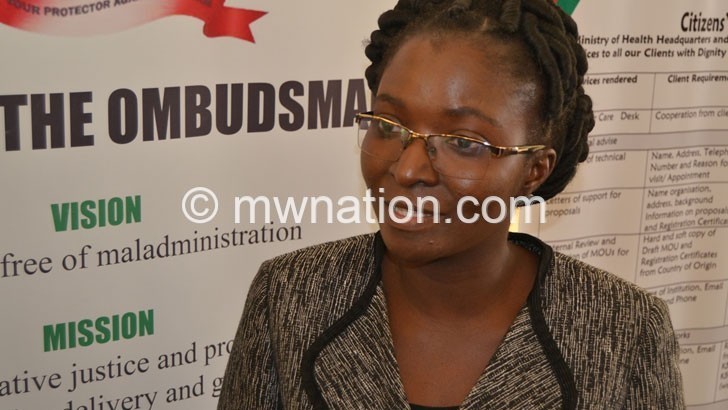Govt owes 560 former public servants billions
Government is neglecting claims for about K2.8 bi-llion for over 500 former public servants whose cases—some dating back to 20 years ago—the Ombudsman has reviewed and told government to pay.
Records from the Office of the Ombudsman also show that a number of former civil servants have died while pressing for payments from Capitol Hill and their widows are still struggling to access the benefits.
Ombudsman Martha Chizuma in an interview on Wednesday observed that as of January 2020, her office had reached resolutions and determinations for Government to pay compensations to 560 claimants but government has not complied.

“To date, the office of Attorney General (AG) and other government ministries, departments and agencies (MDAs) have not complied,” said Chizuma.
The list we have seen includes cases involving terminal benefits and retirement, pension, gratuity, deceased estate, salary arrears, allowances, prolonged interdiction and unfair practices, among others.
From the 560 cases, the highest claim is K72 million and dates back to 20 years ago. The claimant, a former employee for the defunct Malawi Investment Trade Centre (MITC) died before he got his benefits.
Said Chizuma: “The matter is now being pursued by the deceased’s widow. We also made numerous follow ups with MITC which took over from MEPC (Malawi Export Promotion Council).
The Ombudsman also explained in a written statement that her office is waiting for a legal opinion from the office of the Attorney General to advise whether the amount is to be paid by Treasury or MITC.
The lowest claimants are four low cadre officers including security guards from the Department of Forestry who have been chasing K11 000 each some of them for 20 years.
According to Chizuma, the Forestry Department has been citing lack of stationery to process the payments as the reason for non-compliance.
Over 50 teachers are also owed outstanding dues ranging between K30 000 to several millions of kwacha, according to the list.
The Ombudsman is also handling a case of a former public servant Fredrick Sani Stanley who died on September 7 1996—after he had been pursuing his terminal benefits for many years.
Interestingly, during the past 10 years, government has made huge payouts to some companies and individuals in billions of Kwacha as compensation begging the question what criteria Government uses to determine who to pay first. for damaged or looted property
In a telephone interview Attorney General (AG) Kalekeni Kaphale indicated that his office only forwards judgement orders to Treasury for appropriate action.
Said Kaphale: “Treasury should tell you whether there is any system in place for determining payments. Whether it’s first in, first out or least payment gets paid first or biggest payment gets payment first, and so on.”
Another public officer Fredrick Sani Stanley died on September 7 1996 after pursuing his terminal and retirement benefits for 15 years.
Chizuma explained that the Department of Human Resources Management and Development (DHRMD) has refused to pay the benefits arguing that the claimant resigned from the Civil Service which is contrary to findings of former Ombudsman Enock Chibwana.
Said Chizuma: “It is very wrong for government to ignore its poor and small citizens and not pay them what is legally due to them just because they are not politically connected or whatever.”
The Ombudsman added that when millions of Kwacha in compensations are only being paid out to the rich and politically connected Malawians, it hurts those failing to access their claims and paints an ugly picture about the government.
When contacted Minister of Finance Joseph Mwanamveka acknowledged that there are challenges in paying compensations citing inadequate resources as one of the main problems.
Mwanamveka also pointed out the new Public Finance Management Act makes public officers who are costing money liable for their errors or inefficiencies.
Said Mwanamveka: “There are some cases that a controlling officer could have defended in court but chose not to do so knowing that government will pay. But from now onwards such officers will be made to pay the claimed amounts.
But Youth and Society (YAS) executive director Charles Kajoloweka has observed that poor people are struggling to access compensation claims from government because of the failure of the justice system which he said is riddled with corruption.
Kajoloweka indicated that only those who are politically connected are being prioritised when making payouts, which in some instances, is worth billions of kwacha.
Kajoloweka gave an example of office of AG which he said has over the years been operating suspiciously by making huge payments to a few politicians and some business people who are connected to the government of the day.
“Some of the claims that have been paid to politically connected people are compensations which government could have defended but it did not. Some of these claims are dubious,” explained Kajoloweka.
In October 2014, Government paid K3 billion to the Mulli Group of Companies following looting and damage to the group’s firms Sunrise Pharmaceuticals and Chombe Foods. The company sued government to claim compensation for damage of property and loss of business during the July 2011 demonstrations.





